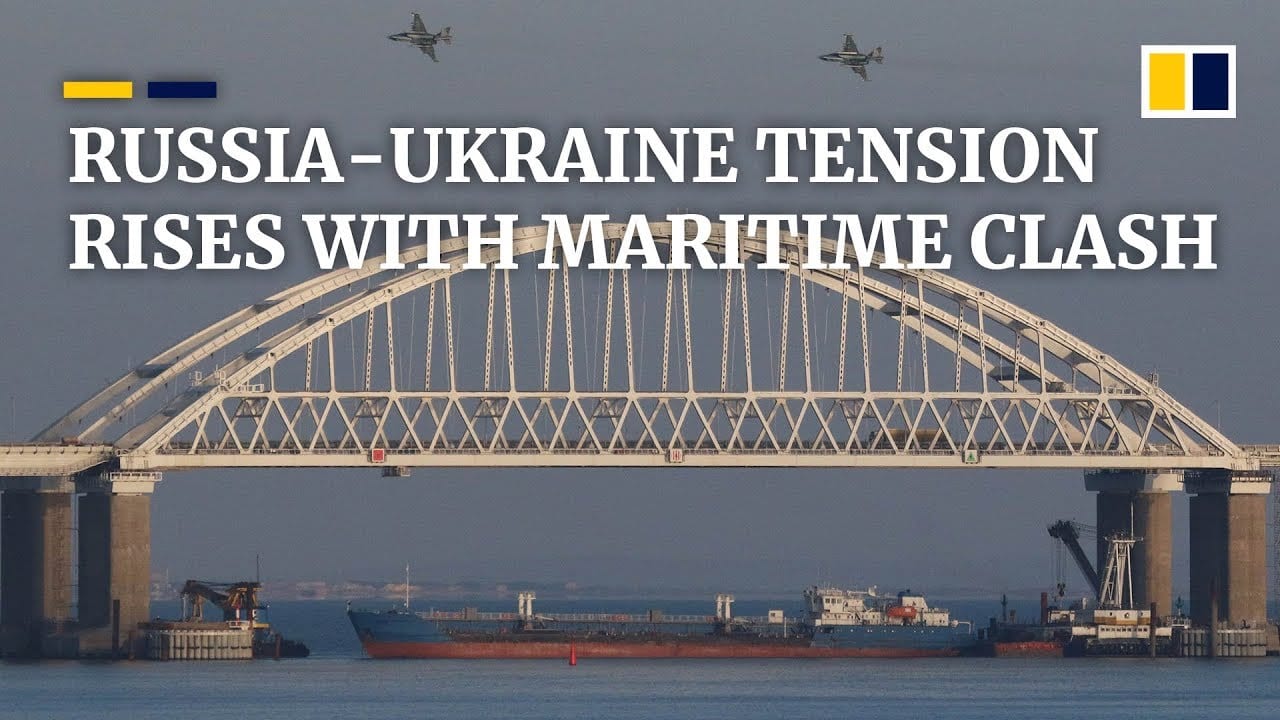Russia extends its aggression in the Azov/Black Sea region
Act of military aggression by Russia near Kerch strait constitutes the new phase of Russian aggressive policy of de-facto occupation of Azov Sea. On November 25, 2018 Ukraine’s warship group was blatantly attacked by the Russian border guard patrol near Kerch strait. Three Ukrainian military ships were shot at and seized by the Russians in neutral waters on their way back to Odesa port. 23 Ukrainian servicemen are captured (the navy suffered casualties: 6 wounded, including 2 in critical condition).
Russia’s provocations clearly fall under the UN definition of the aggression. The United Nations Convention on the Law of the Sea guarantees the rights of Ukraine as a coastal state in waters near the Crimea and the Kerch Strait. Thus, according to Article 2 of the Convention, sovereign rights of Ukraine as a coastal state extend to its territorial waters (within 12 miles) around the Crimean peninsula, even despite unlawful temporary occupation of it by the Russian Federation.
The actions of the Russian Federation regarding the prevention of the passage of warships in the territorial sea of Ukraine, including the attack on the Ukrainian naval forces’ ship «Yani-Kapu», constitute a violation of Article 2 of the Convention.
The next step of Russia on November 25, 2018 was blockade of three Ukrainian ships in the Kerch Strait. The Russian Federation artificially created obstacles for the passage by ships through the Kerch Strait, which is an international duct in the sense of Article 38 of the UNCLOS, and therefore Russia’s actions constitute blocking of navigation through international duct, which is a violation of Articles 38 and 44 of the Convention.
Actions in the Kerch Strait are also a violation of the bilateral Agreement on the use of the Azov Sea and the Kerch Strait, which envisages free passage of the parties’ warships through the Kerch Strait. By its actions, Russia has actually recognized that the Treaty is null and void.
Ukrainian ships have left the Kerch Strait and were moving towards Odesa, after their exit from the territorial waters in the exclusive economic zone of Ukraine they were attacked, stopped and then detained by the Russian Federation. These actions constitute a flagrant violation of the United Nations Convention on the Law of the Sea, namely the interference with and prevention of free navigation and freedom of navigation in the exclusive economic zone, guaranteed by Articles 56, 58, 88, 92, as well as violations of the immunity of warships, envisaged by the Article 32 of the UNCLOS.
The attacks by the Russian Federation on the Ukrainian naval forces’ ships, which moved towards the port of Berdyansk initially in the Black Sea, and then also in the region of the Kerch Strait, constitute another fact of ongoing aggression against Ukraine.
In accordance with UN GA resolution 29/3314 of 14 December 1974, notwithstanding the declaration of war, the act of aggression is an attack of the armed forces of one country on land, sea or air, or on the naval or air forces of another country (article 3d).
Martial law is a critically necessary response to Russian escalatory policy. Russia is trying to turn it into its internal lake by blockade of Berdiansk and Mariupol and by military buildup in Crimea and Azov Sea. Russia has switched from hybrid to overt military aggression. Shooting to kill in Ukrainian sailors and ramming Ukrainian boats, which conducted a legitimate and peaceful maneuver, is a blatant and barefaced use of military force.
As Ukraine enters a critical phase of elections, Russia increasingly activates its hybrid toolbox. Military escalation is one of such tools of meddling.
Fake elections in Donbas in November 2018 reset a spiral of instability and violence. Last time in 2014 fake elections became a preparation for Debaltsevo full-fledged attack.
Actions in the Kerch Strait indicate the creation of prerequisites for the complete blockade of the seaports of Berdyansk and Mariupol, as well as the preparation for a possible full blockade of the Black Sea coast of Ukraine by Russia.
Thus, on November 26, 2018, the Parliament of Ukraine adopted the martial law for limited period – 30 days, in 10 regions of Ukraine in order to create all prerequisites for proper counteraction to Russian acts of aggression.
Prompt and consolidated international reaction must ensure that Russian aggression will not go unpunished. The Russian Federation is fully responsible for the escalation in the Azov and Black Seas and undermining the peaceful settlement of the Russia-Ukraine armed conflict. On the request of Ukraine, the special meeting of the UNSC was held. Nobody believes Russia, isolation of Russia is obvious.
Dramatic escalation of the situation in the region needs a prompt reaction to:
demand Russia to immediately release 23 captured Ukrainian soldiers and 3 ships;
de-escalate security situation;
ensure sustainable unblocking of the free crossing of the Kerch-Yenikale canal and freedom of navigation in Azov sea according to international law;
elaborate of a new set of sanctions aimed at addressing the situation in the region, including against the Russia’s Azov ports, imposition of additional individual, economic and sectoral sanctions;
ensure permanent posture of allies, including NATO military ships, in the Black Sea;
conduct with NATO joint trainings in the Sea of Azov;
provide Ukraine with effective radar to monitor the maritime situation in the region, as well as with naval defense systems;
establish OSCE SMM monitoring in the area of the Sea of Azov and Kerch strait;
support Ukraine’s UN GA draft resolution on the militarization of the Crimea and the Sea of Azov;
Escalation of aggression by Russia is a clear evidence that NS2 should be immediately blocked. If Ukraine will lose its significance as a transit country may encourage Putin to wage a full-scale war to take over Ukraine.

